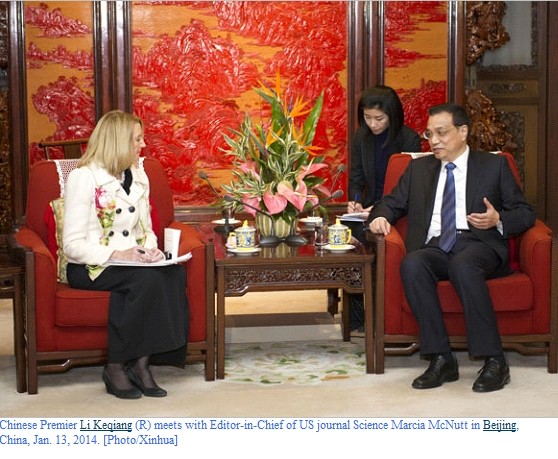By China Daily Updated: 2014-04-10
Premier says country will break constraints through deeper reform

China will break constraints in its institutional mechanisms to facilitate technological innovation and have it play a greater role in future development, Premier Li Keqiang said on Monday.
Li made the remarks in a meeting with the visiting editor-in-chief of Science magazine, Marcia McNutt.
He answered a string of questions from McNutt, covering such topics as space technology, climate change and environmental protection.
"China will deepen reform, break constraints in its institutional mechanisms and make the creativity of people the core in the promotion of innovation," Li said, according to a news release issued after the meeting.
The country will lean more on technology in its economic and social development in the future, he said.
He said technology innovation played an active role in overcoming various difficulties in 2013, leading to stable economic development for the year.
He told McNutt: "In particular, I appreciate the efforts you made in promoting Science's cooperation with Chinese scientists, having their voices and news heard through Science magazine. I hope there will be even stronger cooperation."
McNutt, a US geophysicist and former director of the US Geological Survey, took the helm of the magazine in 2013.
She was the first female director of the USGS since its establishment in 1879, and also the first woman to serve as editor-in-chief of Science since its inception in 1880.
McNutt told Li the meeting was "an honor for science globally".
She said it demonstrates to the world that China views scientific information as essential to its future, and will use it "to solve global problems".
Science, the official journal of the nonprofit American Association for the Advancement of Science, is one of the world's top scientific journals. It has the largest paid circulation of any peer-reviewed, general science journal, and is read weekly by an estimated 1 million people worldwide.
The journal has maintained a good relationship with the Chinese government, reaching back at least to 2008 when then-premier Wen Jiabao sat for an exclusive interview with McNutt's predecessor, Bruce Alberts.
Tao Wenzhao, a senior research fellow of US studies at the Chinese Academy of Social Sciences, said the Chinese leadership sees science as an important driver of progress — "raising the role of science in China's ongoing economic reform, having it to accelerate production and lead the nation to an upper grade in the global industrial chain".
Zhang Daping, a publisher in the Royal Society of Chemistry, a body of professional chemical scientists in the United Kingdom, said the meeting was also "a very good signal for the sci-tech publication industry in China".
He said the industry is having difficulty because most Chinese scientists are encouraged to contribute their best work to foreign journals that are subject to influence.
Zhang suggested the industry should fill in the language gap, follow the Western publishing model and encourage publication groups to integrate journal publications in universities and research institutions across the nation.(Zhang Fan contributed to this story.)
